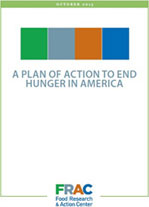April 2, 2021
The Trump administration’s 2019 Department of Homeland Security (DHS) public charge rule has been removed. This victory is in no small part thanks to the tireless work of anti-hunger advocates and Protecting Immigrant Families Campaign partners who helped block the public charge rule and its harms to the nutrition, health, and well-being of immigrant families.
DHS issued a final rule that removed the 2019 public charge rule from the Federal Register and reinstated the 1999 Field Guidance, effective March 9, 2021. DHS also posted a notice stating that the agency has stopped using the 2019 public charge rule for all pending applications and petitions. These DHS actions were preceded by the Biden administration’s decision to stop defending the Trump-era rule in court and ensuing action by federal courts.
What does this mean for immigrant families?
- This means that Supplemental Nutrition Assistance Program (SNAP), and other nutrition programs, are NOT considered in a DHS public charge test.
- Housing programs and Medicaid (except if used to pay for long-term care) also are NOT considered in a DHS public charge test. The only public assistance programs considered are cash assistance for income maintenance and institutionalization for long-term care at government expense.
The return to the 1999 Field Guidance is an essential step that propels our nation forward to a future where all families and individuals, regardless of immigration status, are nourished and healthy.
But it is not a cure-all.
Much work remains to undo the fears and obstacles immigrant families face in accessing nutrition and food programs. These fears include not only those from Trump-era actions but also from other long-standing anti-immigrant actions, as well as myths and misinformation about the federal nutrition programs.
It is vital that anti-hunger advocates and other nutrition stakeholders continue to fight fear with facts and expand outreach to connect more families to SNAP and other federal nutrition programs.
Here are three key ways you can ramp up this work:
- Encourage your state government to issue clear, affirmative messaging on immigrant family access to nutrition programs. Succinct messaging on how eligible immigrant families can safely access nutrition programs without fear of public charge consequences can help update communities and combat misinformation. In addition to agencies that administer food and nutrition programs, elected officials, attorney generals, and schools can be important messengers for publicizing that the public charge rule does not apply to SNAP. State agency examples: California; Massachusetts; and New York City.
- Educate your staff and stakeholders on how immigrant families can access nutrition programs for which they are eligible without fear of public charge consequences and the importance of these programs to their nutrition, health, and well-being.
- Continue to nurture and build relationships with immigrant communities, immigrant-serving organizations, and other other trusted messengers in your area. These partnerships help ensure that families are hearing about federal nutrition and food programs in accurate and easy-to-understand terms that are culturally appropriate, in a language they are familiar with, and from those they trust.
For more ideas on opportunities to connect immigrant families to federal nutrition and food programs and how to address food insecurity, see Food Over Fear: Overcoming Barriers to Connect Latinx Immigrant Families to Federal Nutrition and Food Programs from FRAC and the National Immigration Law Center.
For a detailed history of the Trump-era public charge fight and of the 1999 Field Guidance, see PIF’s Public Charge Update: What Advocates Need to Know Now.
Are you interested in learning more each month? FRAC’s Food Over Fear newsletter provides updates and actions you can take to help address hunger among immigrant families. Sign up here to get your copy.


